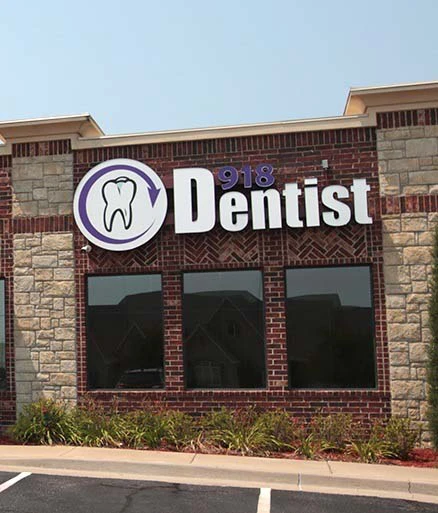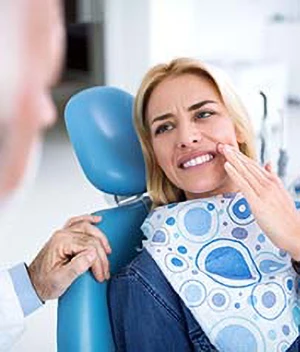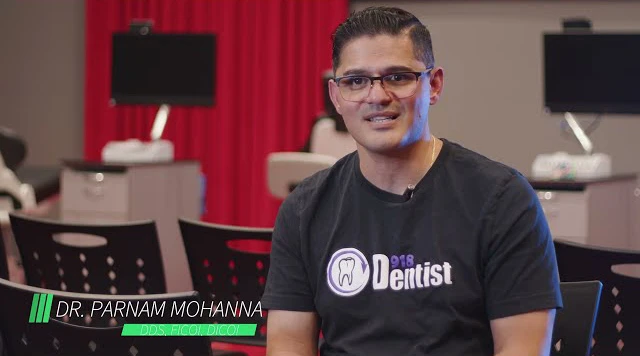Fast Relief
for Dental Pain
& Injury
Emergency Dentist – Glenpool, OK
A dental emergency can happen to anyone, and it rarely occurs at a convenient time. That’s why our team is available to ease your pain and protect your health, whether it’s an infection or a tooth that’s been injured while playing sports. As soon as you realize you have a dental emergency, contact us right away, and we’ll see you as soon as possible for emergency dentistry in the Tulsa area, including Glenpool, OK. For fast relief for dental pain and injury, don’t wait to call The 918 Dentist!
Why Choose 918 Dentist of
Glenpool for Preventive Dentistry?
What to Do in a
Dental Emergency
Some dental emergencies are the result of a sudden physical accident while others are the ultimate result of poor oral hygiene. It’s important to know what to do during a given emergency so that you can give yourself the best chance of keeping your smile whole. Here’s what to do in a dental emergency in Glenpool.

● Step 1: Call us. The sooner you call us, the sooner we can adjust our schedule to see you for a same-day emergency appointment.
● Step 2: Get care over the phone. Once you’ve been scheduled, our experienced team will give you first-aid instructions for handling your emergency until you can reach us.
● Step 3: Get an emergency exam. Your Glenpool emergency dentist will see you right away when you arrive to alleviate your pain and investigate the issue.
● Step 4: Make a treatment plan. After your evaluation, we’ll review the findings and fully explain all your treatment options, working with you to make a plan to address your emergency.
● Step 5: Get the care you need. Before you know it, we’ll be using the latest dental techniques and technology to get your oral health back on track and protect your smile.
The Most Common Dental Emergencies
A dental emergency is a non-life-threatening dental injury that requires immediate treatment from a dental professional. There are also non-urgent dental emergencies that need to be treated right away to avoid serious complications. While examples can range from minor tooth pain to a lost tooth, you’ll find some of the most common ones below. Since it’s better to be safe than sorry, don’t hesitate to give our team a call if you are ever unsure. Regardless of your situation, we’ll do everything we can to help you get back to enjoying a happy, healthy, and pain-free smile as quickly as possible.
Toothaches
Is my toothache a dental emergency?
A toothache in Glenpool can be a dental emergency if you are experiencing pain for more than 24 hours, have a bump occur on your gum tissue, the tooth becomes discolored, or you develop fatigue, fever, or swelling.
How you should handle a toothache:
If the cause of your toothache is something stuck between your teeth, rinse with warm water and use dental floss to remove. Otherwise, take an over-the-counter pain reliever and wait for your appointment.
How we treat toothaches:
Depending on your case, our team will determine the best course. The most common treatment for a toothache can include antibiotics, dental filling, dental crown, periodontal therapy, root canal therapy, or tooth extraction. No matter which one we choose, you can trust we will explain the process and what to expect afterward.
Chipped Tooth
Is a chipped tooth a dental emergency?
A chipped tooth typically does not require immediate attention, but you should go ahead and call our office to schedule an appointment with your emergency dentist in Glenpool. You don’t want your tooth to become infected or suffer any further damage.
How you should handle a chipped tooth:
Much of the same procedures are followed with a chipped tooth as they are with a cracked one. Rinse your mouth with warm salt water and place dental wax or sugarless gum over the jagged area. This will protect your soft oral tissues from possible damage. Also, do not eat on that side of your mouth.
How we treat chipped teeth:
Our team will carefully examine the chip and determine if you need cosmetic bonding, which is fast and effective, or if veneers are more suitable. If you’re worried about your overall appearance, this may be the most viable option.
Cracked Tooth
Is a cracked tooth a dental emergency?
A cracked tooth should be seen by our team sooner rather than later. Because your tooth is now exposed to the elements, we’ll need to administer treatment quickly to minimize your risk for infection or further damage.
How you should handle a cracked tooth:
While waiting for your appointment, rinse your mouth with warm saltwater to eliminate any bacteria and cleanse the area. Place dental wax or sugarless gum over the jagged area of your tooth to prevent damage to your soft oral tissues. You can also take an over-the-counter pain reliever should you notice discomfort.
How we treat cracked teeth:
The crack can exist beneath the gum line. We will take x-rays of your oral cavity to identify the problem and determine how to treat it. If the crack is minimal, we may only need cosmetic bonding. However, if the crack is substantial, we’ll either need to have a dental crown created and placed over the top or perform a tooth extraction.
Sensitive Teeth
Are very sensitive teeth a dental emergency?
If you are suffering from very sensitive teeth, it is likely caused by one of many reasons:
● Worn tooth enamel
● Excessive teeth whitening
● Severe cavity
● Cracked tooth
● Abscess
● Gum recession
No matter the reason behind your sensitive teeth, it’s better to call and schedule an appointment right away. This will allow us to examine your oral cavity in its entirety and identify the underlying problem.
How you should handle very sensitive teeth:
You should avoid hot and cold foods and beverages. You should also forgo eating ice or chewing on objects. Biting your fingernails and using your teeth as tools will also make for a more uncomfortable experience.
How we treat very sensitive teeth:
Your emergency dentist in Glenpool will perform an examination before taking images of your oral cavity. Depending on the cause of your sensitive teeth, the treatments can include everything from tooth-colored fillings, prescription mouthwash, fluoride treatment, dental crowns, periodontal therapy, tooth extractions, and root canal therapy.
Jaw Pain
Is jaw pain a dental emergency?
You should not wait to seek professional help for chronic jaw pain. If you find it difficult to perform normal daily tasks like eating or speaking, go ahead and call our office to schedule an appointment with our emergency dentist in Glenpool.
How you should handle jaw pain:
Our dental team will always provide tips and advice on what you can do to eliminate and manage your pain. Try facial massages and stretches as well as avoid anything that place additional pressure on your jaw. You’ll also need to avoid hard, crunchy foods, as these can irritate your jaw and cause more pain.
How we treat jaw pain:
If your jaw is broken or fractured, you’ll need to first go to the emergency room and receive immediate medical attention before arriving at our office. Otherwise, we will survey the cause of your jaw pain before recommending appropriate treatment, which may include:
● A customized nightguard to combat bruxism (teeth grinding/clenching)
● TMJ Therapy to help relax jaw joints and facial muscles
● Wisdom tooth extraction, as this requires removing your third molars, so they do not cause pain or damage to nearby teeth
Mouth Injuries
Is an injury to the gums, lips, or tongue a dental emergency?
If you bite your tongue, scratch your gums, or bust your lip, there’s no need to seek emergency dental help unless you’re concerned and prefer a professional to examine the injury. These problems can be easily treated at home.
How you should handle an injury:
Rinse your mouth with warm salt water to flush out any bacteria or debris. Place gauze or a damp washcloth over the wound to stop the bleeding. Once this has stopped, you can use a cold compress to minimize any swelling and discomfort.
If you cannot stop the bleeding after 10 minutes, go ahead and drive to your local ER for immediate medical care.
How we treat injuries:
If you choose to see our team of dentists at our Glenpool office for your soft tissue injury, we will determine if you need stitches before discussing the cause of your accident. If physical activity is the culprit, we will recommend a customized mouthguard to be worn while playing sports or engaging in outdoor recreational activities.
Knocked-Out Tooth
Is my knocked-out tooth a dental emergency?
If you have a lost tooth in Glenpool, you need to call our office right away. This type of dental emergency is time-sensitive, so you do not want to wait.
How you should handle a knocked-out tooth:
You’ll first need to retrieve your knocked-out tooth and rinse off any debris. Holding it only by the crown, try to reinsert it into the vacated socket. This may prove unsuccessful, and if it does, simply place it between your cheek and gum inside your mouth or in a container of milk or saliva to keep it moist.
How we treat knocked-out teeth:
Once you arrive at our dental office, our team will evaluate your oral cavity and knocked-out tooth. If it appears fully intact and viable, we will attempt to reimplant it using a splint. Over time, it will reintegrate with the bone tissues. However, if your tooth is damaged or too much time has passed, we’ll need to discard the tooth and begin discussing how to replace it. We can do this with the help of a dental bridge, partial denture, or dental implant.
Loose Tooth
Is a loose permanent tooth a dental emergency?
Yes, a loose tooth in Glenpool should be seen by an emergency dentist as soon as possible. Loose teeth should only occur in a child’s mouth, not an adult’s.
How you should handle loose permanent teeth:
Do not poke or prod at the loose tooth with your finger or tongue, and don’t eat anything hard or crunchy. Also, be careful when brushing and flossing around your loose tooth so you do not cause it to fall out.
How we treat loose permanent teeth:
How we treat this type of dental emergency is ultimately dependent on the cause. If gum disease is spreading and causing a breakdown of the jawbone, your teeth will become loose. This can be treated with the help of periodontal therapy and a possible bone graft.
If your tooth is too loose and cannot be saved, we’ll need to extract it before replacing it. These can include dental bridges, dentures, or dental implants.
Lost Filling Or Crown
Is a lost filling or crown a dental emergency?
Losing a dental filling or crown can cause you to panic, but you should know it is not deemed a dental emergency. Although you will need to have it fixed by a member of our team, you can often wait 1-2 days before seeking professional care.
How you should handle a lost filling or crown:
While waiting for your appointment at home, you’ll need to avoid chewing on that side of your mouth. You’ll also want to avoid hard and crunchy foods and be mindful when practicing good oral hygiene. Brushing or flossing too hard can irritate the area and make your tooth more vulnerable. If you prefer, you can use dental cement to try and temporarily re-bond your filling or lost dental crown in Glenpool.
How we treat a lost filling or crown:
Our team will examine the restoration to see if we can re-cement it into place permanently. If we cannot, the only option is to have new restorations created. We can place a new tooth-colored filling and all-ceramic dental crown to safeguard your smile.
Broken Dentures
Is my broken denture a dental emergency?
When faced with a broken denture in Glenpool, you’ll need to get in to see us as soon as possible.
How you should handle a broken denture:
You should avoid wearing your denture at home. If you cannot be without your teeth, there are denture repair kits approved by the ADA you can purchase, but these should only be used in emergency situations.
How we treat broken dentures:
Once we evaluate the severity of the damage, we will recommend the following options:
● Bonding to fix small, minor damages
● A new denture to replace the old, broken one
● Dental implants to transition from dentures
Something Stuck Between the Teeth
Having an object stuck between your teeth is not cause for a dental emergency, especially if you can remove it with warm water and dental floss. However, if you use a toothpick, tweezers, a fork, or any other sharp object, you put yourself at risk for serious injury, damaging your teeth and soft oral tissues.

Understanding the Cost of
Dental Emergencies
Some emergencies can be treated with prescription antibiotics, and others might require advanced procedures. As such, the cost of your emergency visit will depend on your unique circumstances. Of course, that doesn’t mean you should put off care that you need simply because of cost. Dental emergencies rarely get better on their own, which could increase the total price tag of your care further. We’ll make sure we fully understand your situation before creating a price estimate for you.
Understanding the Cost of
Dental Emergencies
Some emergencies can be treated with prescription antibiotics, and others might require advanced procedures. As such, the cost of your emergency visit will depend on your unique circumstances. Of course, that doesn’t mean you should put off care that you need simply because of cost. Dental emergencies rarely get better on their own, which could increase the total price tag of your care further. We’ll make sure we fully understand your situation before creating a price estimate for you.

Every Dental Emergency Has a Unique Cost
If you need to visit the dentist for an emergency, you may be surprised to find that the visit itself is actually inexpensive in most cases. At this appointment, our team members will examine your specific concerns and find out which treatment it is that you need to get your oral health back to normal. Remember, it’s essentially impossible to know what your specific oral healthcare costs will be until this exam is performed.
With that said, the most common treatments we perform to resolve dental emergencies include:
● Root canal therapy
● Extractions
● TMJ treatment
● Dental crowns and other services!

Does Dental Insurance Cover Dental Emergencies?
Thankfully, most dental insurance plans offer some level of dental emergency coverage. For example, it’s not uncommon to receive at least one emergency exam as part of your coverage. In addition, treatments that are often related to emergency dentistry (i.e. root canal therapy, extractions, etc.) can receive anywhere between 50% and 80% coverage in most cases. However, your plan is likely unique, which means it may have its own set of yearly maximums that can affect how much coverage you receive. This is why it’s important to contact your insurance company before committing to any specific treatment.

Other Options for Making
Dental Emergencies Affordable
While we are in-network with many dental insurance plans, we understand that some patients do not make use of dental insurance at this time. In this instance, we encourage you to consider our other financing options to make your care more affordable.
This includes CareCredit, a third-party financier that allows for monthly payment plans and low-to-zero interest financing. Of course, you can also join our dental office’s Loyalty Plan. Through it, you can get discounts on services like root canal therapy, oral surgery, and dental crowns. On top of that, we’re happy to provide a special offer on emergency exams!
No matter what dental emergency you’re experiencing, our team is always ready to help you navigate cost. That’s why you should never hesitate to give us a call for guidance and to ask us any questions.

Taking Care of Your Smile Can Save You Big
It’s true that dental emergencies are not always avoidable. For example, a bad fall could happen out of nowhere and leave your tooth damaged. However, most dental emergencies tend to happen because of an untreated dental issue, such as an infection or decay. When you take the time to invest in your long-term oral health, you can easily save hundreds and even thousands of dollars a year.
The moment you are aware of a tooth that’s damaged or causing you pain, you should call our dental office right away. Even if you are worried about the costs associated with treating this issue, you should keep in mind that putting off your treatment could result in even higher costs later (and discomfort that becomes too unbearable to ignore.)


How to Prevent Dental Emergencies
You can’t always avoid having a broken, knocked-out, or hurting tooth, but there are ways you can minimize your risk of having to suddenly visit our emergency dental office in Glenpool. Taking a few simple precautions can go a long way toward protecting your pearly whites from damage and infection. After all, the old adage, “an ounce of prevention is worth a pound of cure” is never truer than when it comes to your oral health! Here are a few easy ways to keep your smile as healthy as possible.
How to Prevent Dental Emergencies
You can’t always avoid having a broken, knocked-out, or hurting tooth, but there are ways you can minimize your risk of having to suddenly visit our emergency dental office in Glenpool. Taking a few simple precautions can go a long way toward protecting your pearly whites from damage and infection. After all, the old adage, “an ounce of prevention is worth a pound of cure” is never truer than when it comes to your oral health! Here are a few easy ways to keep your smile as healthy as possible.

Visit Your Dentist Regularly
If you’re like most people, you’d rather see your dentist at regular six-month appointments than deal with an abrupt emergency that makes you drop everything and schedule an appointment. That’s why we can’t recommend visiting us for routine checkups and cleanings enough. At these appointments, we can find tooth decay and gum disease in their early stages before they become real emergencies.

Maintain Good Oral Hygiene Habits at Home
Simply brushing and flossing daily is one of the best ways to prevent dental emergencies in Glenpool. When you neglect to clean your teeth and gums every day, dangerous bacteria and plaque will build up in your mouth. Eventually, this can lead to cavities, weakened tooth enamel, and inflamed, infected gums. Luckily, you can keep your teeth strong and clean by taking the time to brush, floss, and rinse with mouthwash every day.

Stick to a Nutritious Diet
Chances are you already know that eating too much sugar increases your risk of getting cavities. However, you should also be aware that acidic beverages, like sports drinks and soda, can also contribute to dental emergencies by eroding your tooth enamel. Instead, stay hydrated with tap water. It most likely contains fluoride, a naturally occurring mineral that strengthens your enamel and fortifies them against injury, decay, and infection. Similarly, swapping out sugary snacks for ones with vitamin C, calcium, and phosphorous can promote healthy gums and teeth.

Wear a Mouthguard
If you’re playing any type of sport where there’s a risk of impact to the face, you should wear a mouthguard to shield your pearly whites from injury. We can provide you with one of these trays that has been personalized to match your unique dentition, making it fit more comfortably and protect your teeth more effectively.
In the same vein, you need to wear a nightguard if you tend to grind your teeth while you sleep (a condition called bruxism). Chronic jaw clenching and teeth grinding can weaken or chip your teeth and lead to sensitivity and TMJ disorder. A custom nightguard from our dental office provides cushioning against these problems.

Use Tools, Not Teeth to Open Packaging
If you’re in a rush, it can be tempting to open a package, bottle, or other container with your teeth. It may seem like you’re saving time in the moment, but you could easily chip or break a tooth, which will end up costing you a whole lot more time (and money!) later on. Save yourself an emergency dental visit by reaching for the right tool for the job.


Dental Emergency FAQ’s
Still have questions? Want to be as prepared as possible? We want to help! If you have a specific question on your mind, we encourage you to contact our dental office so our knowledgeable team can provide you with immediate assistance. However, if you’d like to do a bit more research before reaching out, that’s okay too! Read on for the answers to emergency dentist FAQs in Glenpool.
Dental Emergency FAQ’s
Still have questions? Want to be as prepared as possible? We want to help! If you have a specific question on your mind, we encourage you to contact our dental office so our knowledgeable team can provide you with immediate assistance. However, if you’d like to do a bit more research before reaching out, that’s okay too! Read on for the answers to emergency dentist FAQs in Glenpool.

Should I Go to the ER or an Emergency Dentist?
When it comes to treating your teeth and gums, visiting our team at 918 Dentist of Glenpool is usually the best choice. After all, most ERs don’t have a dentist on staff, meaning they can only manage your pain, not treat the root of the issue. With that being said, if your dental injury has resulted in a life-threatening condition, like a deep facial cut, difficulty breathing, or a broken jaw, then you should call 911. Once you’ve received medical attention, you can schedule an urgent appointment at our dental office.
How Can I Manage Swelling in My Mouth?
Swelling is one of the most common symptoms of a dental injury, and it can make remaining comfortable virtually impossible. Fortunately, there are a few at-home remedies you can use to alleviate puffiness! First, try rinsing with a mixture of salt and warm water. Not only will this help prevent infection, but it can relieve inflammation. Next, place a cold compress (or towel-wrapped ice pack) against the outside of your cheek. This will both decrease inflammation and temporarily numb the area.
What Should I Put In a Dental Emergency Kit?
Dental emergency kits seem superfluous until you’re amid a panic-inducing dental emergency. While first-aid kits typically have a few essentials, they rarely have dental-related tools, which is why it is so important to pack a separate case for your home and car. Below are a few items we recommend:
● Floss
● Non-latex gloves
● Temporary filling
● Gauze pads
● Salt
● Over-the-counter pain medication
● Dental or compact mirror
● A case big enough to hold a dislodged tooth
● Our dental office’s emergency contact information
